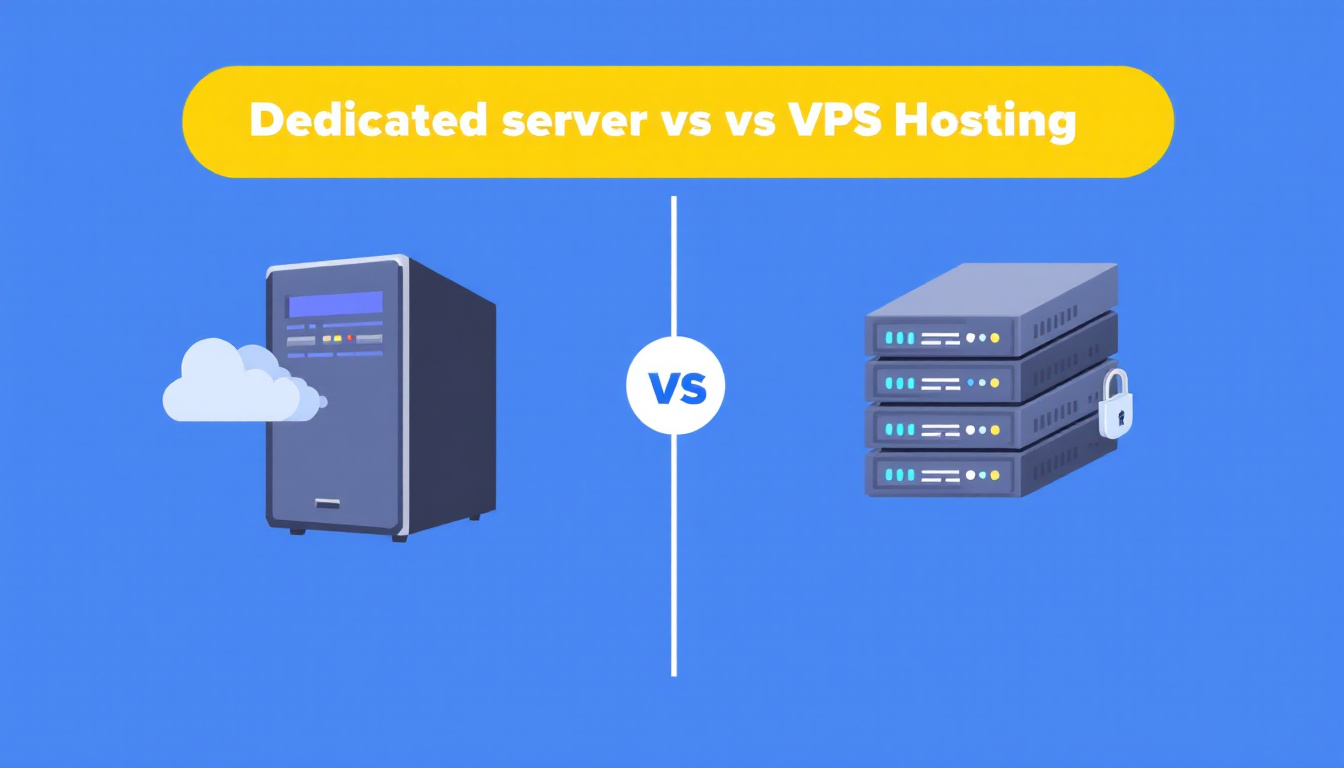Selecting the right hosting solution is a key decision for IT professionals, developers, and businesses. Dedicated servers and Virtual Private Servers (VPS) each offer distinct benefits for those building scalable and reliable online services. Dedicated servers provide exclusive resources and full control, while VPS delivers a flexible, cost-efficient environment by partitioning a physical server into separate virtual instances.
Understanding the core differences between these options helps organizations match performance, security, and cost to their technical requirements. By weighing these factors, teams can select the infrastructure that best supports their growth and security goals.
Understanding Dedicated Servers and VPS Hosting
Before making an informed decision between dedicated servers and VPS hosting, it is important to understand how each solution works at a technical level. Both deliver unique models of resource allocation, management, and security, influencing the way businesses approach hosting for various needs.
What is a Dedicated Server?
A dedicated server is a physical machine allocated to a single client. All compute, memory, and storage resources are reserved exclusively for one organization or project, eliminating the resource-sharing found in other hosting models.
 Photo by Brett Sayles
Photo by Brett Sayles
With a dedicated server:
- Performance is consistent and predictable since no other users occupy the same hardware.
- Isolation is absolute. This provides greater control over configurations, operating systems, and installed software.
- Security standards can be elevated as sensitive data does not share resources—ideal for regulated sectors.
- Customization options are extensive, allowing for hardware upgrades, OS reinstallation, and advanced security setups.
Typical use cases for dedicated servers include:
- High-traffic websites and large ecommerce platforms requiring maximum uptime.
- Custom enterprise applications or databases needing specific performance and compliance.
- Agencies and resellers managing multiple websites with guaranteed isolation.
Organizations prioritize dedicated hardware when full control and consistent performance are required. For a more technical overview, see the detailed explanation of how dedicated servers work at RackSolutions.
What is VPS Hosting?
VPS hosting uses virtualization to partition one physical server into several independent virtual machines. Each VPS functions as an individual server with allocated resources—CPU, memory, and storage—but shares the underlying hardware with other VPS instances.
How VPS hosting works:
- Virtualization software creates separate environments, or “containers,” for each user.
- Resource allotment ensures a defined share of hardware, but with some limits compared to dedicated hardware.
- Multi-tenancy allows many users on one machine, each isolated from the others.
Advantages of VPS hosting include:
- Scalability: Resources can be increased quickly as demands grow.
- Cost-efficiency: Sharing hardware lowers the overall cost per user, making it suitable for growing businesses.
- Administrative flexibility: Each VPS can run its own operating system, allowing users to configure environments as needed.
Common scenarios for VPS hosting:
- Mid-sized businesses moving beyond shared hosting, yet not requiring a full dedicated server.
- Developers needing isolated environments for testing, development, or running multiple applications.
- Agencies handling moderate website portfolios with predictable resource needs.
Virtualized environments are widely adopted for balancing cost and performance. For further insights on multi-tenancy and its benefits for business hosting, review the practical guidance at WorkOS.
Both dedicated servers and VPS hosting fit specific business and IT requirements. Understanding these fundamentals helps teams match the right solution to their growth and security strategies.
Key Differences: Dedicated Server vs VPS
Choosing between a dedicated server and a VPS comes down to how resources are allocated, security requirements, level of control, and the long-term cost. Each hosting solution offers unique strengths, and understanding these distinctions helps in matching server technology to specific business and technical needs.
Performance and Resource Allocation
Dedicated servers make all hardware resources—CPU, memory, and storage—available exclusively to a single user. This means businesses get predictable, high performance regardless of the workload. There is no resource competition, so applications operate at peak efficiency during heavy traffic or demanding processing tasks.
With VPS hosting, resources are allocated through virtualization. Each instance gets a guaranteed portion of CPU and memory. However, the physical server’s resources are still shared among multiple VPS users. While modern hypervisors minimize cross-tenant impact, performance can fluctuate if demand surges on neighboring instances. This makes VPS a strong fit for moderate workloads but less ideal for resource-intensive, mission-critical systems.
- Dedicated server: Consistent, reliable performance even during spikes.
- VPS: Good performance for most business uses, but may see occasional slowdowns if hardware is oversubscribed.
For more technical performance details, visit the VPS vs Dedicated Server: Head-to-Head Comparison.
Security and Isolation
Security priorities often influence the choice between dedicated and virtualized hosting. Dedicated servers provide physical isolation. Only one organization’s data resides on the server, and no other tenants have access to the environment. This makes it possible to implement custom firewalls, advanced monitoring, and hardware-based security controls.
VPS environments offer logical isolation—each virtual machine is separated by software, not by hardware. While most reputable hosting providers secure virtualization layers, vulnerabilities can still emerge if system patches lag or the hypervisor is compromised. Compliance-heavy industries often favor dedicated hardware to meet strict regulatory standards.
- Dedicated server: Physical isolation reduces attack surfaces.
- VPS: Strong isolation under most circumstances, but with some shared infrastructure risk.
In-depth comparisons on security models can be found in the AWS dedicated server vs VPS breakdown, and for practical VPS protection methods see VPS Security: How to Keep Your Data Secure.
Customization and Control
Dedicated servers offer full administrative control. Organizations can select the operating system, install custom drivers, upgrade hardware, and tailor every aspect of the environment. This flexibility is important for businesses running proprietary software stacks or needing specific kernel modules.
A VPS grants root or administrator access within its own virtual boundary, but some aspects are limited by the underlying host. While users can modify the OS and deploy most applications, hardware changes and some low-level configurations may require provider involvement.
- Dedicated server: Complete control over hardware, software, and networking.
- VPS: Extensive but not absolute control—some settings may be restricted by virtualization.
 Photo by Christina Morillo
Photo by Christina Morillo
For more advanced customization advice, reference our internal guide on the pros and cons of managed hosting.
Pricing Structure and Cost Considerations
Dedicated servers come at a premium. Users pay for the exclusive use of an entire physical machine, which includes higher upfront and ongoing costs. Expenses may also rise with support plans, hardware upgrades, and data center fees. Dedicated servers prove cost-effective when performance, isolation, or regulatory needs justify the investment.
VPS hosting offers much lower entry points. Since the underlying server is shared, providers distribute costs across customers. This allows businesses to scale resources or migrate to more robust plans as needed, without committing to the full expense of dedicated hardware.
- Dedicated server: Higher monthly and upfront costs, justified by exclusive access.
- VPS: Affordable pricing, suitable for smaller or scaling businesses. Predictable billing based on chosen resources.
An in-depth breakdown of cost differences is available through this dedicated vs VPS cost analysis.
When budgeting for server infrastructure, always evaluate workload demands and future growth expectations. Both hosting options fit distinct budgets and business phases, making it essential to align technology investment with organizational goals.
Choosing the Right Hosting Solution for Your Business
Selecting between a dedicated server and a VPS extends beyond technical specs; the decision must align with your organization’s needs, compliance standards, and the internal capabilities of your team. Each type of hosting suits certain scenarios better, particularly when planning for business growth, meeting security requirements, and navigating management options.
Business Needs and Growth
 Photo by panumas nikhomkhai
Photo by panumas nikhomkhai
Every hosting decision starts with an honest look at current workloads and future growth plans. Enterprises running resource-heavy applications, real-time analytics, or experiencing rapidly increasing user bases often require dedicated servers to keep performance consistent. Exclusive hardware access eliminates resource competition, making these setups ideal for large ecommerce platforms, SaaS providers, or high-availability services.
For small to medium-sized organizations or projects where growth is expected but not yet realized, a VPS presents an adaptable solution. Start with modest resources and scale up as demands change. This scalability makes VPS a preferred choice for startups and digital entrepreneurs moving beyond shared hosting.
Consider these practical factors:
- Predictable traffic and workloads—dedicated servers provide clear performance advantages.
- Fluctuating, seasonal, or unpredictable usage—VPS allows for resource adjustments without major migration.
- Budget control—for businesses with strict cost management, the lower entry cost of VPS solutions helps balance investment and growth.
For actionable ideas on building and scaling digital ventures, reference practical methods in these Small Business Ideas for 2025 and strategies on Financial Planning Tips for Digital Entrepreneurs.
Compliance and Security Requirements
Industries such as healthcare, finance, and ecommerce handle sensitive personal or payment data that is regulated by standards like GDPR, HIPAA, or PCI-DSS. Here, compliance and security cannot be an afterthought. Dedicated servers offer clear physical isolation, reducing exposure to threats shared with other tenants, and allow full control over patch management, logging, and network segmentation.
VPS solutions, while logically separated, still share the underlying hardware—a concern when strict compliance audits require physical isolation or guarantee of single-tenant status. When third-party auditors review your infrastructure, dedicated hosting reduces loopholes and simplifies documentation.
Important aspects to review:
- Data storage policies—consider where and how client or patient data is physically stored.
- Access controls—ensure granular, auditable controls are enforceable on your chosen platform.
- Encryption and logging—dedicated servers support stronger, customizable tools and workflows.
A strong understanding of these principles is essential. Explore further details and best practices in Network Security Basics for current frameworks and controls.
Technical Expertise and Server Management
Managing server infrastructure is a recurring responsibility and its complexity varies with the type of hosting selected. Dedicated servers grant full administrative privileges, but demand deeper technical knowledge. System administrators must handle OS patching, hardware monitoring, intrusion detection, backups, and disaster recovery plans.
VPS environments can be managed or unmanaged. Managed offerings shift daily maintenance, security patching, and basic support to the provider, freeing IT teams from low-level workloads. Unmanaged options require in-house expertise for every task, increasing the need for skilled professionals.
When deciding, consider:
- In-house skills—do your administrators have experience in server hardening, monitoring, and troubleshooting?
- Time and resources—managed plans offload routine tasks, letting small teams focus on development, not server upkeep.
- Customization needs—full control means more responsibility.
For guidance on server management platforms and automation tools, review the DeepSeek guide for IT pros, which outlines methods for balancing flexibility and efficiency.
Choosing the right hosting solution is about matching technology with your organization’s real priorities. Evaluate growth forecasts, compliance obligations, and available skills to support an informed, sustainable choice.
Use Cases: When to Choose Dedicated Server or VPS
Identifying the right hosting environment depends on your technical requirements and business goals. Not every project demands the same level of resources, control, or investment. This section differentiates when a dedicated server makes sense over a VPS and where VPS shines, using scenarios from IT, development, and business operations.
High-Traffic Websites and Applications
 Photo by panumas nikhomkhai
Photo by panumas nikhomkhai
Dedicated servers are preferred when performance and uptime must remain stable even as demand fluctuates. When a website or application receives large volumes of visitors daily—such as ecommerce platforms, media sites, or ticketing systems—a shared environment may not meet performance goals. High-traffic operations require:
- Full access to CPU and memory at all times
- Large storage and high-speed input/output operations
- Guarantee of resource availability under peak loads
Resource-intensive workloads like video streaming, data analytics, or heavy client databases often overload VPS environments. Dedicated servers offer the necessary headroom for growth and reduce latency, supporting several high-traffic projects simultaneously. Industry sources further outline the business case for exclusive hardware in demanding web applications and online services (A2Hosting: Dedicated Server Hosting for High-Traffic, Cyfuture: Dedicated Servers for High-Traffic Requirements).
Key use cases include:
- Large ecommerce storefronts with flash sales
- SaaS platforms with thousands of simultaneous logins
- Real-time analytics and data processing in finance or healthcare
- Video on demand and live streaming infrastructures
These situations call for predictable resources. Dedicated servers eliminate contention and deliver the reliability organizations expect for their mission-critical workloads.
Startup, Development, and Testing Environments
VPS hosting fits agile development cycles, prototyping, and sandbox environments. Startups, software teams, and electronics developers often need quick access to servers they can fully configure, test, and reset—without overcommitting resources or budget. VPS platforms provide:
- Flexible scaling, so resources can be added or removed as needed
- Complete administrative access for rapid deployments, versioning, and rollbacks
- Safe isolation from production environments
For parallel development and QA, each VPS instance can mirror a different application stage (dev, staging, production), all on the same hardware but fully separated. This setup allows for:
- Infrastructure as code and automated CI/CD pipelines
- Reproducible test beds for electronics simulations and firmware testing
- Secure environments for penetration and compliance testing
Providers offer tailored VPS hosting for developers and testing, making it easy to clone or snapshot servers and minimize downtime. Guides by third parties highlight best practices (DigitalOcean: VPS Hosting Plans, OVHCloud: VPS Sandbox) and show how teams improve iteration speed without hardware lock-in.
VPS is the practical choice here, especially for:
- Startups building a minimum viable product
- Software vendors testing across multiple system stacks
- Teams experimenting with different OS or technology stacks before final rollout
For extra detail on platform flexibility, see our resource on managed cloud hosting pros and cons.
Cost-Efficient Hosting for Small Businesses
Affordability is a primary concern for small businesses and new ventures. Many do not require full server isolation or the ability to customize every hardware detail. Instead, they need:
- Reliable uptime and basic security
- Room for growth as website traffic increases
- Predictable, manageable monthly costs
VPS hosting distributes server expenses across users, allowing businesses to start small and add resources only as demand grows. This keeps initial investments low while maintaining key technical benefits. Common scenarios where VPS fits include:
- Company websites or shops in early launch phases
- Business management platforms with moderate user counts
- Electronics or IT consultancies hosting internal documentation and client portals
Several external reviews compare VPS and shared hosting options, showing clear savings for organizations planning steady but moderate growth (PCMag: Best Small Business Hosting Services, Forbes: Cheapest Web Hosting).
In summary:
- VPS brings cost control and flexibility, letting businesses avoid the upfront financial commitment of dedicated hardware.
- Dedicated servers address unique, high-demand workloads with strict performance and security requirements.
For businesses weighing these choices, our guide on financial planning for digital entrepreneurs provides more tools for evaluating IT costs as the business grows.
Conclusion
The decision between a dedicated server and VPS should be based on clear technical needs, security expectations, and financial planning. Dedicated servers provide resource certainty, maximum control, and strong isolation, while VPS solutions deliver adaptable performance and lower recurring costs for most growing businesses.
Selecting the right model means weighing long-term workloads, compliance factors, and internal capabilities. Planning for both today’s operations and tomorrow’s expansion ensures the hosting environment will not constrain future growth.
For businesses looking to align infrastructure investments with lasting value, reviewing guidance from Financial Planning Strategies for Digital Product Entrepreneurs in 2025 will help inform IT budgeting choices. Careful assessment at this stage supports reliable, efficient operations and a solid foundation for your digital strategy.



![How to List Electronic Products on Amazon KDP in 2025 [Updated]](https://thespartane.com/wp-content/uploads/2025/04/how-to-list-electronic-products-amazon-kdp-2025-63e758b6-1-300x171.jpg)
![React JS Developer Tools: Essential Features and Best Practices for Efficient Development [Updated 2025]](https://thespartane.com/wp-content/uploads/2025/04/react-js-developer-coding-profile-2a536a90-300x171.jpg)


![Costco Food Court Menu Nutrition Facts and Healthier Choices [2025 Update]](https://thespartane.com/wp-content/uploads/2025/04/costco-food-court-menu-nutrition-2025-update-70a75690-300x171.jpg)
![Digital Products for Niche Software Developers [2025 Guide]](https://thespartane.com/wp-content/uploads/2025/04/1-300x171.jpg)
